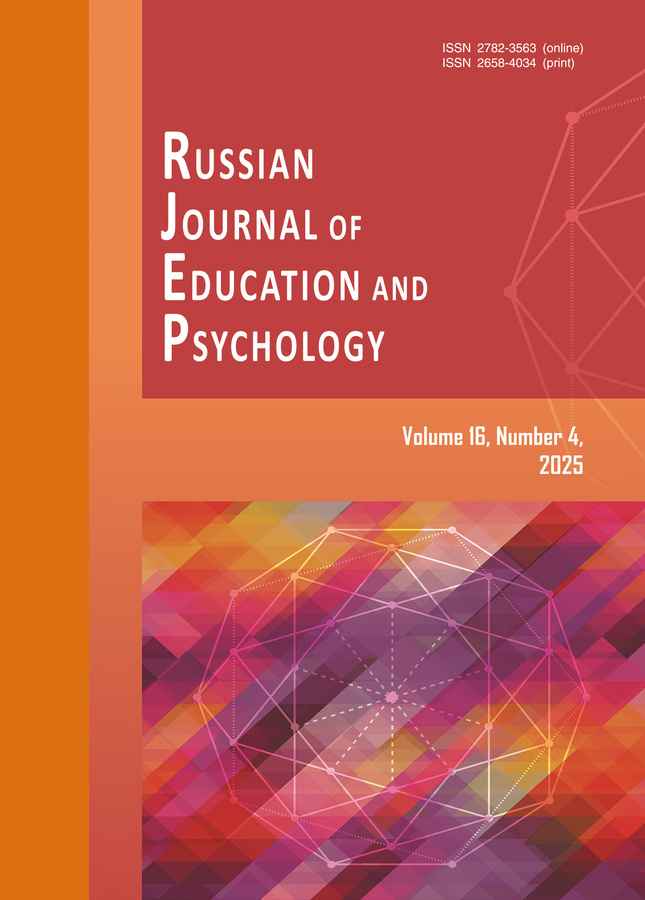Critical thinking as tacit knowledge
- Authors: Golubinskaya A.V.1, Viakhireva V.V.1
-
Affiliations:
- Lobachevsky State University of Nizhny Novgorod
- Issue: Vol 16, No 4 (2025)
- Pages: 429-451
- Section: Psychological Studies
- Published: 30.09.2025
- URL: https://journal-vniispk.ru/2658-4034/article/view/349047
- DOI: https://doi.org/10.12731/2658-4034-2025-16-4-908
- EDN: https://elibrary.ru/THTCKG
- ID: 349047
Cite item
Full Text
Abstract
Background. Over the past decades, critical thinking has become one of the key competencies in education, science, and society. However, despite its recognized significance, the concept remains theoretically vague and conceptually fragmented: the lack of definition is known as both research-related and practical challenge. The diversity of interpretations leads to a situation in which multiple, sometimes incompatible, approaches coexist under the same term. This article proposes an alternative approach by conceptualizing critical thinking as a form of tacit knowledge.
Purpose. To identify implicit interpretations of critical thinking in educational practice based on classroom observation in a university setting.
Materials and methods. The study was conducted through observation of university classes. The object of observation was a set of courses that explicitly stated the goal of developing the universal competency “The ability to critically analyze problematic situations […]” The analysis focused on specific forms of pedagogical activity that reflect instructors’ assumptions about critical thinking, such as the design of tasks, responses to student errors, and the moderation of classroom discussions.
Results. The main finding of the study is the identification of two fundamentally different approaches to critical thinking: the classical approach, focused on the universal norms of reasoning, and the non-classical approach, emphasizing the ability to engage with alternative perspectives. It was found that participants in the educational process do not strictly adhere to one approach or the other, but rather shift between them depending on the context. Thus, the study demonstrates that the conceptual ambiguity of critical thinking should not be viewed as a weakness or a shortcoming of scientific knowledge, but as a reflection of its complex and context-dependent nature.
About the authors
Anastasiia V. Golubinskaya
Lobachevsky State University of Nizhny Novgorod
Author for correspondence.
Email: golub@unn.ru
ORCID iD: 0000-0002-7119-3968
SPIN-code: 3660-9790
Scopus Author ID: 57408306200
ResearcherId: AAN-2296-2021
Ph.D., Senior Researcher at the Laboratory of Social Anthropology of the Institute of International Relations and World History
Russian Federation, 23, Gagarin Ave., Nizhny Novgorod, 603950, Russian Federation
Valeriia V. Viakhireva
Lobachevsky State University of Nizhny Novgorod
Email: vvv@fsn.unn.ru
ORCID iD: 0000-0002-7060-1149
SPIN-code: 6581-1129
Scopus Author ID: 58030558400
ResearcherId: KTH-9688-2024
Junior Researcher at the Laboratory of Social Anthropology of the Institute of International Relations and World History
Russian Federation, 23, Gagarin Ave., Nizhny Novgorod, 603950, Russian Federation
References
- Bobrova, A. S. (2017). Critical thinking. The problem of definition. RACIO.ru, 1, 26–36. https://elibrary.ru/YZPBZB
- Bykova, A. S., Sakharova, N. S., & Kirillova, I. K. (2021). Modern trends in interpreting the concept of «critical thinking». Bulletin of Orenburg State University, 3(231), 6–11. https://doi.org/10.25198/1814-6457-231-6. https://elibrary.ru/SGFBTL
- Koreshnikova, Yu. N. (2019). Development of critical thinking in modern Russian society: What does university provide? Monitoring of Public Opinion: Economic and Social Changes, 6(154), 91–110. https://doi.org/10.14515/monitoring.2019.6.06. https://elibrary.ru/QRBGZR
- Koreshnikova, Yu. N. (2021). Organizational and pedagogical conditions for developing critical thinking in university students (207 pp.) [Doctoral dissertation, Candidate of Pedagogical Sciences]. Moscow: Higher School of Economics.
- Lisenkova, A. D. (2023). Clusters of critical thinking skills in modern high school students. Pedagogy. Issues of Theory and Practice, 8(5), 463–469. https://doi.org/10.30853/ped20230084. https://elibrary.ru/IFZXES
- Arribas, C. M., Arcos, R., & Gertrudix, M. (2025). Rethinking education and training to counter AI enhanced disinformation and information manipulations in Europe: A Delphi study. Cogent Social Sciences, 11(1), 2501759. https://doi.org/10.1080/23311886.2025.2501759
- Carter, A. G., Sidebotham, M., & Creedy, D. K. (2022). International consensus definition of critical thinking in midwifery practice: A Delphi study. Women and Birth, 35(6), e590–e597. https://doi.org/10.1016/j.wombi.2022.02.006. https://elibrary.ru/SLCMUH
- Facione, P. A. (1990). Critical thinking: A statement of expert consensus for purposes of educational assessment and instruction (The Delphi Report) (19 pp.). Millbrae: The California Academic Press.
- Follman, J. (1987). Teaching of critical thinking / Thinking Promises! Promises! Informal Logic, 9(2), 131–140. https://doi.org/10.22329/il.v9i2.266
- Hashimoto, M. et al. (2023). Building consensus on critical thinking assessment tool for undergraduate nursing students in a socialist lowmiddle income country: A Delphi study. Heliyon, 9(4), 21 p. https://doi.org/10.1016/j.heliyon.2023.e15086. https://elibrary.ru/PFGAMP
- Kolstø, S. D., Paulsen, V. H. P., & Mestad, I. (2024). Critical thinking in the making: Students’ critical thinking practices in a multifaceted SSI project. Cultural Studies of Science Education, 19(4), 499–530. https://doi.org/10.1007/s11422-024-10217-3. https://elibrary.ru/IOWDIS
- Leibovitch, Y. M. et al. (2025). Teachers’ (evolving) beliefs about critical thinking education during professional learning: A multicase study. Thinking Skills and Creativity, 56, 101725. https://doi.org/10.1016/j.tsc.2024.101725. https://elibrary.ru/AKBNNF
- McPeck, J. (1984). The evaluation of critical thinking programs: Dangers and dogmas. Informal Logic, 6(2), 9–13. https://doi.org/10.22329/il.v6i2.2727
- Noone, C., Bunting, B., & Hogan, M. J. (2016). Does mindfulness enhance critical thinking? Evidence for the mediating effects of executive functioning in the relationship between mindfulness and critical thinking. Frontiers in Psychology, 6, 2043. https://doi.org/10.3389/fpsyg.2015.02043
- Pears, M. et al. (2025). Enhancing creativity and cognitive skills in healthcare curricula: Recommendations from a modified Delphi study on virtual reality integration. Thinking Skills and Creativity, 57, 101810. https://doi.org/10.1016/j.tsc.2025.101810
- Pecorino, P. A. (1987). Critical thinking and philosophy. Informal Logic, 9(2), 141–145. https://doi.org/10.22329/il.v9i2.2670
- Phelps, E. A. (2006). Emotion and cognition: Insights from studies of the human amygdala. Annual Review of Psychology, 57, 27–53. https://doi.org/10.1146/annurev.psych.56.091103.070234
- Siegel, H. (1985). Educating reason: Critical thinking, informal logic, and the philosophy of education. Informal Logic, 7(2), 69–81. https://doi.org/10.22329/il.v7i2.2706
- Zhao, W. (2024). (Re)Searching critical thinking in a Hong Kong classroom: A postfoundational reflection on ignorant modernity. ECNU Review of Education, 20965311241265373. https://doi.org/10.1177/20965311241265373. https://elibrary.ru/VROUJQ
Supplementary files










